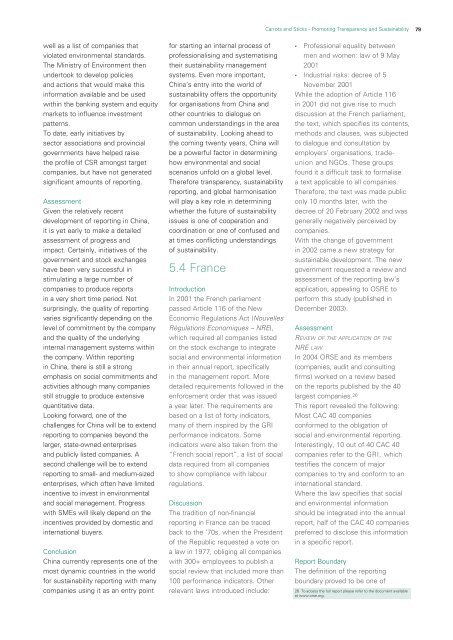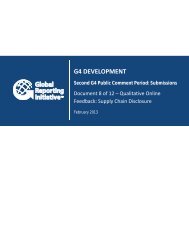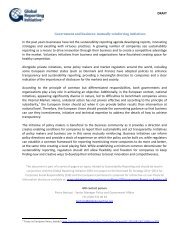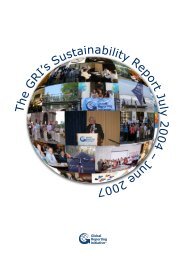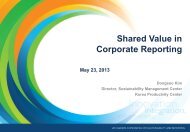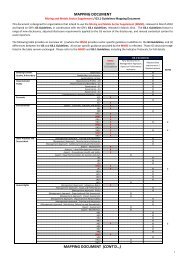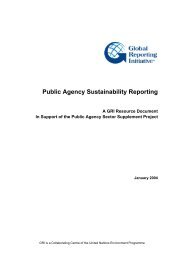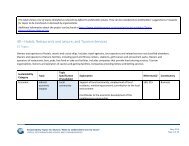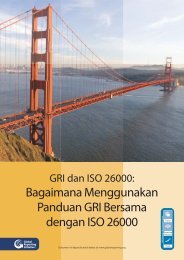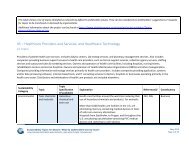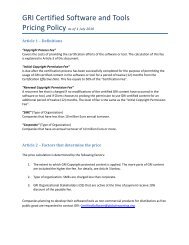CARROTS AND STICKS – PROMOTING ... - Global Reporting Initiative
CARROTS AND STICKS – PROMOTING ... - Global Reporting Initiative
CARROTS AND STICKS – PROMOTING ... - Global Reporting Initiative
Create successful ePaper yourself
Turn your PDF publications into a flip-book with our unique Google optimized e-Paper software.
well as a list of companies that<br />
violated environmental standards.<br />
The Ministry of Environment then<br />
undertook to develop policies<br />
and actions that would make this<br />
information available and be used<br />
within the banking system and equity<br />
markets to influence investment<br />
patterns.<br />
To date, early initiatives by<br />
sector associations and provincial<br />
governments have helped raise<br />
the profile of CSR amongst target<br />
companies, but have not generated<br />
significant amounts of reporting.<br />
Assessment<br />
Given the relatively recent<br />
development of reporting in China,<br />
it is yet early to make a detailed<br />
assessment of progress and<br />
impact. Certainly, initiatives of the<br />
government and stock exchanges<br />
have been very successful in<br />
stimulating a large number of<br />
companies to produce reports<br />
in a very short time period. Not<br />
surprisingly, the quality of reporting<br />
varies significantly depending on the<br />
level of commitment by the company<br />
and the quality of the underlying<br />
internal management systems within<br />
the company. Within reporting<br />
in China, there is still a strong<br />
emphasis on social commitments and<br />
activities although many companies<br />
still struggle to produce extensive<br />
quantitative data.<br />
Looking forward, one of the<br />
challenges for China will be to extend<br />
reporting to companies beyond the<br />
larger, state-owned enterprises<br />
and publicly listed companies. A<br />
second challenge will be to extend<br />
reporting to small- and medium-sized<br />
enterprises, which often have limited<br />
incentive to invest in environmental<br />
and social management. Progress<br />
with SMEs will likely depend on the<br />
incentives provided by domestic and<br />
international buyers.<br />
Conclusion<br />
China currently represents one of the<br />
most dynamic countries in the world<br />
for sustainability reporting with many<br />
companies using it as an entry point<br />
for starting an internal process of<br />
professionalising and systematising<br />
their sustainability management<br />
systems. Even more important,<br />
China’s entry into the world of<br />
sustainability offers the opportunity<br />
for organisations from China and<br />
other countries to dialogue on<br />
common understandings in the area<br />
of sustainability. Looking ahead to<br />
the coming twenty years, China will<br />
be a powerful factor in determining<br />
how environmental and social<br />
scenarios unfold on a global level.<br />
Therefore transparency, sustainability<br />
reporting, and global harmonisation<br />
will play a key role in determining<br />
whether the future of sustainability<br />
issues is one of cooperation and<br />
coordination or one of confused and<br />
at times conflicting understandings<br />
of sustainability.<br />
5.4 France<br />
Introduction<br />
In 2001 the French parliament<br />
passed Article 116 of the New<br />
Economic Regulations Act (Nouvelles<br />
Régulations Economiques <strong>–</strong> NRE),<br />
which required all companies listed<br />
on the stock exchange to integrate<br />
social and environmental information<br />
in their annual report, specifically<br />
in the management report. More<br />
detailed requirements followed in the<br />
enforcement order that was issued<br />
a year later. The requirements are<br />
based on a list of forty indicators,<br />
many of them inspired by the GRI<br />
performance indicators. Some<br />
indicators were also taken from the<br />
“French social report”, a list of social<br />
data required from all companies<br />
to show compliance with labour<br />
regulations.<br />
Discussion<br />
The tradition of non-financial<br />
reporting in France can be traced<br />
back to the ’70s, when the President<br />
of the Republic requested a vote on<br />
a law in 1977, obliging all companies<br />
with 300+ employees to publish a<br />
social review that included more than<br />
100 performance indicators. Other<br />
relevant laws introduced include:<br />
Carrots and Sticks - Promoting Transparency and Sustainability<br />
• Professional equality between<br />
men and women: law of 9 May<br />
2001<br />
• Industrial risks: decree of 5<br />
November 2001<br />
While the adoption of Article 116<br />
in 2001 did not give rise to much<br />
discussion at the French parliament,<br />
the text, which specifies its contents,<br />
methods and clauses, was subjected<br />
to dialogue and consultation by<br />
employers’ organisations, tradeunion<br />
and NGOs. These groups<br />
found it a difficult task to formalise<br />
a text applicable to all companies.<br />
Therefore, the text was made public<br />
only 10 months later, with the<br />
decree of 20 February 2002 and was<br />
generally negatively perceived by<br />
companies.<br />
With the change of government<br />
in 2002 came a new strategy for<br />
sustainable development. The new<br />
government requested a review and<br />
assessment of the reporting law’s<br />
application, appealing to OSRE to<br />
perform this study (published in<br />
December 2003).<br />
Assessment<br />
Review o f the application o f the<br />
nRe law<br />
In 2004 ORSE and its members<br />
(companies, audit and consulting<br />
firms) worked on a review based<br />
on the reports published by the 40<br />
largest companies. 26<br />
This report revealed the following:<br />
Most CAC 40 companies<br />
conformed to the obligation of<br />
social and environmental reporting.<br />
Interestingly, 10 out of 40 CAC 40<br />
companies refer to the GRI, which<br />
testifies the concern of major<br />
companies to try and conform to an<br />
international standard.<br />
Where the law specifies that social<br />
and environmental information<br />
should be integrated into the annual<br />
report, half of the CAC 40 companies<br />
preferred to disclose this information<br />
in a specific report.<br />
Report Boundary<br />
The definition of the reporting<br />
boundary proved to be one of<br />
26 To access the full report please refer to the document available<br />
at www.orse.org.<br />
79


